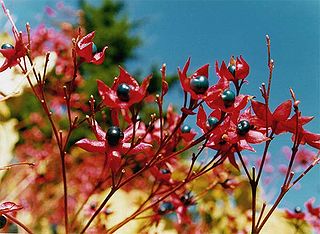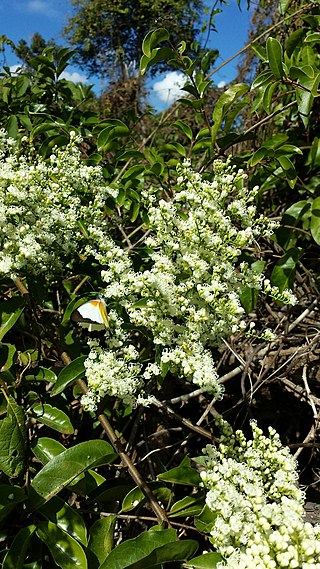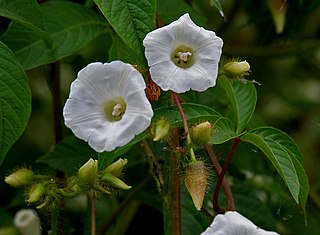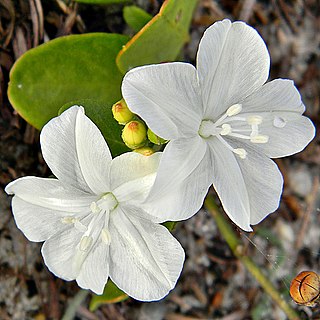
Convolvulaceae, commonly called the bindweeds or morning glories, is a family of about 60 genera and more than 1,650 species. These species are primarily herbaceous vines, but also include trees, shrubs and herbs. The tubers of several species are edible, the best known of which is the sweet potato.

Argyreia is a genus of plants in the family Convolvulaceae.

Clerodendrum is a genus of flowering plants formerly placed in the family Verbenaceae, but now considered to belong to the Lamiaceae (mint) family. Its common names include glorybower, bagflower and bleeding-heart. It is currently classified in the subfamily Ajugoideae, being one of several genera transferred from Verbenaceae to Lamiaceae in the 1990s, based on phylogenetic analysis of morphological and molecular data.

Bonamia is a genus of the flowering plant family Convolvulaceae, commonly known as the bindweed family and named after the French physician and botanist François Bonamy (1710-1786). Members of the genus are commonly known as the lady's nightcap.

Metaporana is a genus of plants in the bindweed family Convolvulaceae.

Seddera is a genus of plants in the bindweed family Convolvulaceae. There are currently 20 known species of the plant. Although it is mainly African, the plant extends to Arabia and India.

Aeschynomene is a genus of flowering plants in the family Fabaceae, and was recently assigned to the informal monophyletic Dalbergia clade of the Dalbergieae. They are known commonly as jointvetches. They range across tropical and subtropical regions of the Americas, sub-Saharan Africa, south, southeast, and east Asia, and Australia. These legumes are most common in warm regions and many species are aquatic.

Operculina is a genus of plants in the morning-glory family which that are found throughout the world.

Merremia is a genus of flowering plants in the morning glory family, Convolvulaceae. Members of the genus are commonly known as woodroses.

Jacquemontia is a genus of plants in the morning glory family Convolvulaceae. Species in this genus are commonly known as clustervine.

Ipomoea oenotherae is a species of plant of the morning glory genus, Ipomoea, in the family Convolvulaceae. It derives its name from the resemblance it bears to plants in the genus Oenothera. Ipomoea oenotherae is a succulent and a cryptophyte.

Astripomoea is a genus of flowering plants belonging to the family Convolvulaceae.

Maripa is a genus of flowering plants belonging to the family Convolvulaceae.

Distimake is a genus of flowering plants belonging to the family Convolvulaceae.
Hyalocystis is a genus of flowering plants belonging to the family Convolvulaceae.
Neuropeltis is a genus of flowering plants belonging to the family Convolvulaceae.

Stictocardia beraviensis is a species of rapidly growing perennial vining plant in the family Convolvulaceae. It is native to West Africa and Madagascar and widely cultivated elsewhere for its soft, cordate leaves and attractive red flowers. It is commonly called Hawaiian bell vine although this is a misnomer as it is in reality not native to Hawaii.















